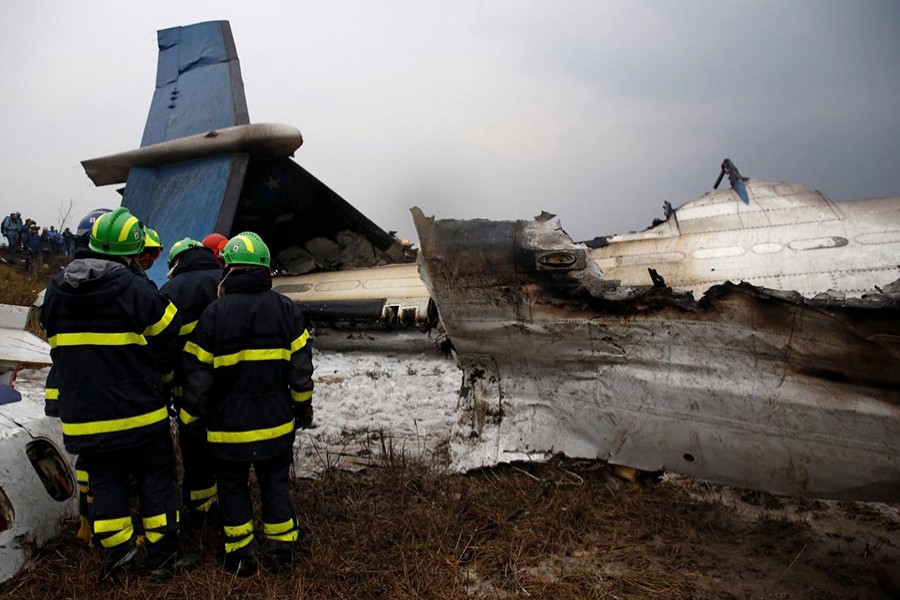One British and another Indian insurance company hold 98.5 per cent stake in the US$100 million insurance coverage for the US-Bangla Airlines plane that crashed in Nepal, sources said as stories of the tragedy kept unfolding.
In Bangladesh, Sena Kalyan Insurance Company Ltd and Sadharan Bima Corporation are acting as primary insurers for the 78-seater Bombardier Dash 8 Q400 airplane that crashed at Nepal's Tribhuvan airport last Monday, leaving 49 people dead.
The airlines made a $100 million insurance deal with Sena Kalyan Insurance Company, a subsidiary of the Sena Kalyan Sangstha, during the purchase of this aircraft.
Later, Sena Kalyan handed over 50 per cent of the insurance share to Sadharan Bima Corporation as per the rules.
Out of the 50 per cent, Sena Kalyan holds only 0.1 per cent and the rest were handed over to two foreign companies.
Of those, Halifax, a subsidiary of the global insurance giant Lloyds, holds 80 per cent and an Indian insurance company named General Insurance Corporation of India (GIC) holds 20 per cent, sources in the airlines and insurance industry told the FE yesterday (Sunday).
Sadharan Bima Corporation did the same thing but kept 0.95 per cent of the stake in the total coverage.
KM Dastur, a Malaysian-based financial broker, had facilitated the deals among the primary insurers and the foreign companies, the sources said as the reckoning of financial liabilities for the fatal air accident goes on.
It is learnt that two teams of loss adjusters flew in to Dhaka from Singapore soon after the accident and started their assessment, amid a flurry of activities in Dhaka and Kathmandu surrounding the crash, including rescue, treatment of the few survivors and autopsy of the dead.
They went to Kathmandu the following day and are working over there until now, competent sources told the FE yesterday.
According to the deal, the loss adjusters will submit an assessment report and insurance claim would be settled as per their report.
If they find any fault with the airlines company, then the liability of the insurance companies will be lessened but the victims will get their due compensation as per the international aviation law.
When contacted, CEO of the Sena Kalyan Insurance Company Brig-General (Rtd) Md Shafique Shamim admitted that the insurance coverage was reinsured in a bid to minimise risks.
"Since we are holding a nominal fraction, our liability is also nominal," he added.
However, the victims of the US-Bangla aircraft crash will get much less due to the country's failure to ratify the Montreal Convention 1999, which governs the aviation rules.
As per the Montreal Convention, in case of death of passengers, the airline is liable to pay up to 113,100 Special Drawing Rights for each passenger. This works out to approximately $174,000 at current rates. But since Bangladesh has not ratified the Convention, the compensation will be governed by the Warsaw Convention drafted in 1929. According to it, damages for injury or death were capped at only around $33,000.
Brig Shamim said they were trying to expedite the insurance-claim-settlement process in line with the instructions from the high-ups.
The fateful aircraft that crashed last Monday was first delivered to Scandinavian Airlines in 2001, and then sold to Augsburg Airways in 2008 before being handed down to the US-Bangla Airlines in 2014. It already had been involved in another incident in 2015, when it skidded off the runway in Saidpur. There were no injuries. The aircraft sustained minor damage and returned to service eight hours later.
Talking to this correspondent, US-Bangla General Manager, PR, Kamrul Islam said they sent letters to both the insurance agencies claiming compensation a day after the accident had occurred.
Experts in civil-aviation law said aircraft accident has many dimensions -- on-board accident, off-board accident, luggage missing, property damage due to aircraft crash -- whether it is on domestic or international flights.
Nevertheless, if any passenger gets injured or dies owing to airplane crash, the victim -- and the victim's family if the victim is dead -- can claim compensation from the air carrier.
According to them, one can claim compensation regardless of the terms and conditions put by the airline or travel agent while purchasing the ticket.
The meaning of accident under the Convention is an unexpected or unusual event or happening that is external to the passenger.
However, the victim's family may claim higher than this amount if they think the amount is not sufficient for their loss. In this case, the air carrier can contest that claim before the court and they can avoid the higher amount if they can prove that the death took place due to the negligence or any other wrongful act or omission of a third party other than the airline or its staff or agent, Brig Shamim said.
According to aviation experts, the survivors of a plane crash normally suffer two types of losses -- physical/monetary and psychological. The first includes monetary loss of an injured person including medical-treatment cost, loss of income, loss of an organ (if any) whereas psychological loss denotes pain and sufferings arising out of that accident.
As per law every injured person is entitled to get compensation in his/her country of origin regardless of the place of the accident. The responsibility of an airline is a strict liability in that case and there is no need to prove any negligence from the part of the aircraft or any third-party intervention.


